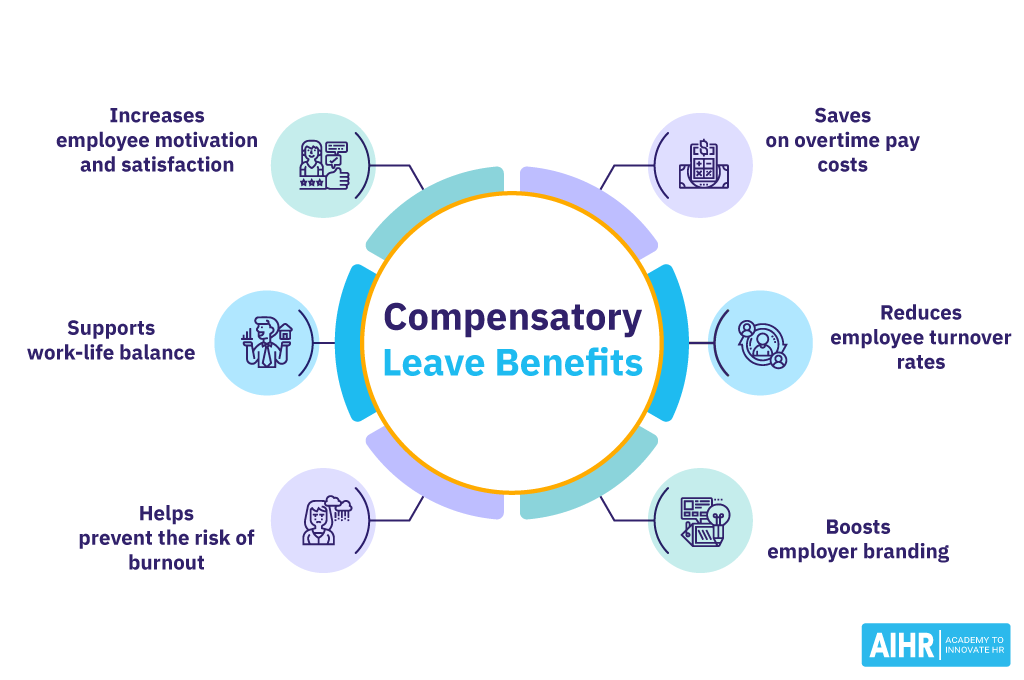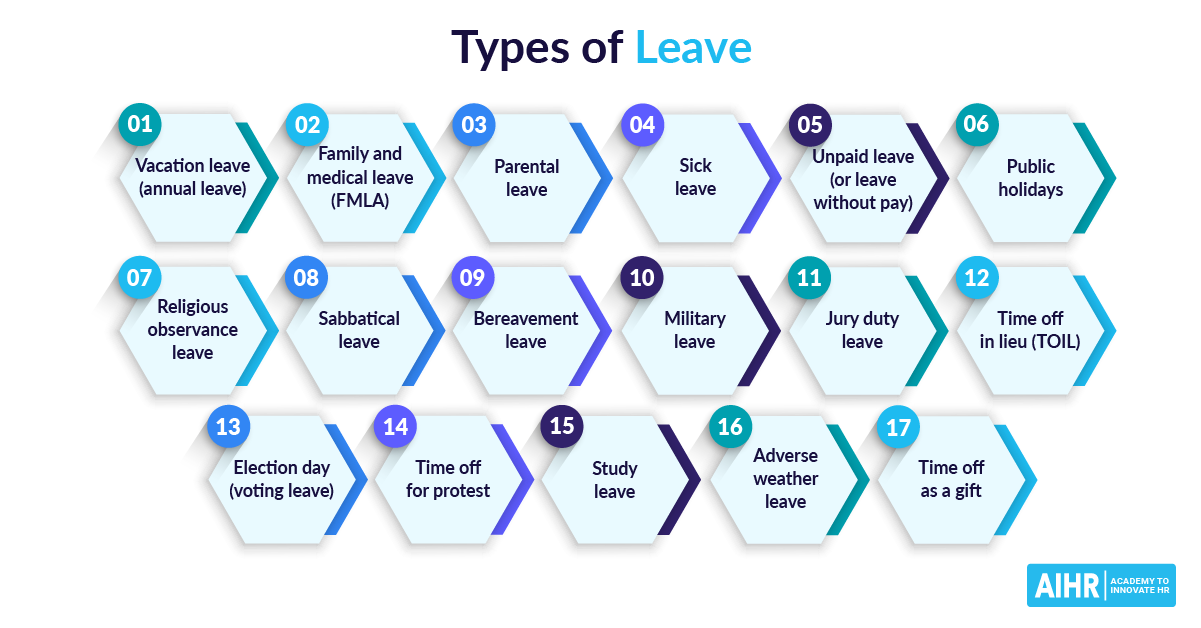Compensatory Leave
Compensatory leave meaning
Compensatory leave is paid time off given to employees in lieu of overtime pay for hours worked beyond their standard work schedule. It serves as an often desirable alternative for both employers and employees as a way to balance uneven and demanding schedules.
Compensatory leave is often referred to as “comp time” or “pay in lieu” of overtime because it is accrued to compensate workers for putting in extra hours.
Compensatory leave is most commonly implemented in industries where it’s common to work long, irregular hours, like healthcare, first responders, or law enforcement. Organizations must make sure that their compensatory time policy aligns with applicable laws and regulations.
Types of compensatory leave
- Standard comp time: Earned when an employee works beyond their scheduled hours and opts for time off instead of overtime pay. This is common in both public and government sectors.
- Travel comp time: Granted for time spent traveling outside of regular working hours that is not otherwise compensated. This can be common in jobs requiring frequent business travel.
- Holiday comp time: Offered when employees work on scheduled holidays. Instead of receiving holiday pay, they might opt for equivalent time off.
- Flextime comp time: Accumulated when employees work extra hours under a flextime arrangement, allowing them to later shorten another workday or take a day off entirely.
How does compensatory leave work?
Comp time is granted by the hour when an employee would normally collect overtime pay. Employees must sign an agreement to the accrual of comp time instead of overtime, and in return, employees can take paid days off when there is less work or less demand for team hours.
Because comp leave replaces overtime, the rate of accrual must be granted at time and a half. In other words, if an employee works 10 hours of overtime, they must be granted 15 hours of paid leave.
Accrual
Compensatory leave is available for both hourly and salaried workers.
Hourly workers earn comp time based on the definition of overtime for their role and may also accrue comp time if they work during their designated days off.
Salaried workers may be granted comp time if working more than 40 hours a week is made mandatory, depending on the employer’s discretion.
Usage and expiration
In the US, comp time must be used in the next 26 pay periods from the time of earning.
However, in the UK, the time off in lieu (TOIL) laws only require that employees sign an agreement to work more than 48 hours a week, including overtime and time that earns comp leave. Expiration rules are up to the discretion of the employer, who may place a time limit or allow comp leave to roll over indefinitely.
Limitations
Some states may place a limit on the total number of hours of comp time an employee can accrue.
The typical limitation is 120 or 240 hours of unspent comp time. However, this varies by region, so both employers and professionals should remain aware of any local limitations.
Legality
In the US, comp time is usually permitted for government employees, but there are greater restrictions on private-sector employees under the FLSA. Employers are allowed to offer comp time in lieu of overtime pay, but policies must ultimately comply with overtime pay laws.
This means comp time must be granted at time and a half, and employees must agree to receive comp time instead of overtime payments. Also, comp time must be approved within the time limit or paid as overtime.
If these requirements are not met, employers are at risk of being in violation of overtime labor laws.

Comp time vs. overtime
Let’s summarize the differences between comp time and overtime.
Definition
When an employee works over their agreed working hours (e.g., 40 hours) a week and receives 1.5 hours of paid leave for each hour of overtime worked.
When an employee works over their agreed working hours (e.g., 40 hours) a week and receives 1.5x their wage for each hour of overtime worked.
Rate
1.5 hours of paid leave for every hour of overtime worked
1.5x the wage for each hour of overtime worked
Example
12 hours of paid time off for 8 hours of overtime
$20/hr becomes $30/hr for overtime hours
Applicable to
Employees who agree to compensatory leave
Nonexempt employees and exempt workers with mandatory 40+ hour weeks
Legal considerations
Employers must allow employees to spend that time away from work while paid or cash out their paid leave days to avoid violating overtime pay laws.
It is illegal to misclassify a worker as nonexempt or deny someone legal pay at the overtime rate for any reason.
You may also wonder about the difference between compensatory leave and PTO (paid time off).
PTO is usually granted as a benefit and part of the compensation package. It is part of the agreed compensation for performing a role, while compensatory leave is a sub-category of PTO granted only for overtime hours that go beyond the role’s initial definition.
Who is eligible for compensatory leave?
Government workers
All or most government workers are eligible for compensatory leave, which is managed in a regulated fashion.
Hourly workers
Hourly workers qualify for compensatory leave any time they work more than 40 hours a week, thus qualifying for overtime pay. In most industries, hourly workers may agree to comp time in lieu of overtime pay. It’s best to consult legal counsel to navigate these scenarios.
Salaried workers
Salaried workers are FLSA-exempt employees. While they are usually exempt from overtime or comp time, they can accrue and use compensatory leave, provided it aligns with their organization’s policies.
HR tip
Compensatory leave is based on overtime pay. Calculate all employee’s rightful overtime before implementing a comp time policy. Ensure the employees agree to receive comp time before you can substituting their overtime pay for paid time off. It is also vital that employees are able to spend their compensatory leave, which is why this policy is most common in industries with irregular working hours.
HR best practices when developing a compensatory leave policy
Compensatory leave is a valuable tool for HR professionals to manage employee work hours and promote a healthy work-life balance. When creating your compensatory leave policy, you need to consider the following:
- Familiarize yourself with federal, state, and local laws regarding comp time, overtime, and employee classification. Ensure your policy adheres to these regulations.
- Make overtime calculations a top priority.
- Make sure your employees agree to and are happy with comp time instead of overtime.
- You need to guarantee that there’s enough time for everyone to spend their compensatory leave.
- Effectively communicate the comp time policy to all employees and make sure they understand how it works, how they accrue it, its limitations, and how they can use it.
- Periodically review and update your compensatory leave policy so it remains relevant and compliant with changing laws and organizational needs.
FAQ
An example of compensatory leave could be an employee who works two extra hours on a Monday and then takes two hours off on Friday without loss of pay.
The length of compensatory leave typically matches the amount of overtime worked. For example, in many organizations, employees receive one hour of compensatory leave for every hour of overtime worked. The specifics can vary by country, company policy, or employment contract, with some allowing a 1.5 times accrual rate for overtime hours.
Comp time is time off given to employees in lieu of overtime pay for extra hours worked, typically used in governmental or certain salaried positions. Paid time off (PTO), on the other hand, is a consolidated block of time off that employees can use for vacation, illness, or personal days, and is accumulated over time based on company policy. PTO is a more standardized benefit, whereas comp time specifically compensates for overtime hours worked without additional pay.







